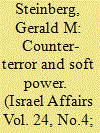|
|
|
Sort Order |
|
|
|
Items / Page
|
|
|
|
|
|
|
| Srl | Item |
| 1 |
ID:
160938


|
|
|
|
|
| Summary/Abstract |
For many years, the network of non-governmental organizations (NGOs) claiming a human rights agenda has consistently sought to delegitimise Israel’s counterterrorism strategy. This phenomenon was prominent during the 2008–2009 and 2014 Gaza wars, when these groups issued hundreds of statements condemning Israel, and in campaigns calling for UN commissions of inquiry (e.g. the Goldstone and Schabas/Davis investigations) into Israeli ‘war crimes’. NGO allegations were also the foundations of lawfare, including efforts to prosecute Israeli officials in the International Criminal Court and other venues, and for BDS campaigns against Israeli and Jewish targets. In this soft-power strategy, the perception of NGO officials as ‘security experts’ provides a major source of legitimacy, lending credence to their reports, despite the lack of credible fact-finding methodologies. Similarly, NGO legal analyses, based on problematic and aspirational interpretations, are accepted and echoed widely, without independent verification. In response, the IDF and Ministry of Defence first ignored and then sought to engage the NGOs in order to persuade them to accept Israeli perceptions and counterterror policies. When these responses failed, the emphasis shifted to countering NGO credibility in legal and diplomatic venues, which has also had limited impact to date.
|
|
|
|
|
|
|
|
|
|
|
|
|
|
|
|
| 2 |
ID:
188635


|
|
|
|
|
| Summary/Abstract |
This article analyses Brazil’s 1975 vote in favour of United Nations General Assembly Resolution 3379, which equated Zionism with racism and racial discrimination. Historians and political scientists have investigated extensively the causes for this vote. However, all these analyses focus on Brazil’s relations with other state actors whilst ignoring the possibility that domestic factors, including Brazilian leaders’ attitudes towards Zionism, influenced the decision to support the anti-Zionist resolution. Drawing on archival materials from Brazil and Israel, the article introduces domestic and normative factors into the analysis of this controversial vote. It argues that Brazil’s desire to secure oil imports and financial investments from Arab countries, combined with its repudiation of diasporic allegiances, best explain its support for the resolution. Whilst the Brazilian dictatorship’s delegitimisation of diasporic loyalties was not the primary reason for the decision, it constituted an important element in the normative framework that enabled it.
|
|
|
|
|
|
|
|
|
|
|
|
|
|
|
|
| 3 |
ID:
158144


|
|
|
|
|
| Summary/Abstract |
Efforts to isolate and delegitimise nations pose a growing danger to state security. The components used in such efforts are, however, not fully understood. This article expands upon existing research by proposing that there are seven areas in which states can face isolation efforts: political, economic, military, sociocultural, media, lawfare, and religious. Moreover, it proposes the idea of ‘destruction-oriented’ isolation, which aims to destroy a state, not merely create change. The ongoing campaign against Israel serves as the case study. Gaining a better understanding of these different tools will allow states to better prepare themselves to withstand these threats.
|
|
|
|
|
|
|
|
|
|
|
|
|
|
|
|
|
|
|
|
|